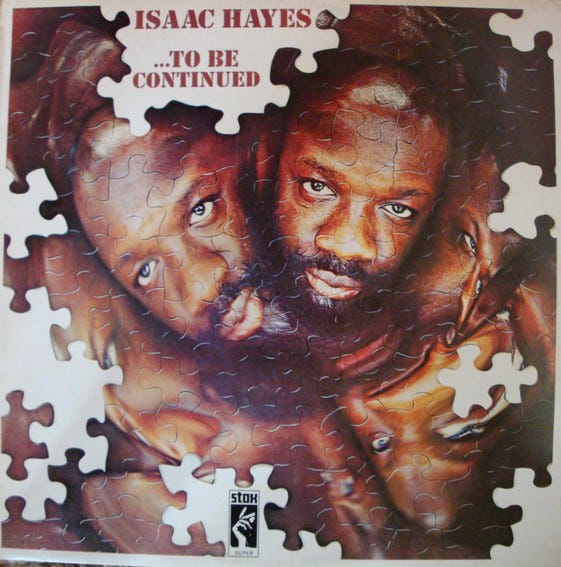Isaac Hayes' '...To Be Continued' and the Frequent Sampling of "Ike's Mood I"
Disco Four replays, Marley Marl sample flips, vintage Three 6 production, forgotten R & B gems, and other songs that found inspiration in a classic Stax piano breakdown.
In late 1970 Isaac Hayes released his self-produced album ...To Be Continued on Stax records. The album proved to be both a commercial and critical success. A standout selection in its own right, “Ike’s Mood I” (part of the medley “Ike's Mood I/You've Lost That Lovin' Feelin’”) also turned into an important building block for sampling 12 years after Stax pressed up the initial run of Hayes’ seminal record.
It all started with Disco Four’s “We're At The Party” and producer Eric Matthew’s excellent utilization of a subtle “Ike’s Mood I” interpolation. Almost forty years after its release the song is finding a new audience on YouTube and racking up a solid play count.
New Yorkers and folks on the east coast are likely most familiar with Marley Marl’s use of the sample on Biz Markie’s “Make the Music With Your Mouth, Biz”—a classic song that is an important sample source in its own right. According to Brian Coleman’s book Check the Technique: Liner Notes for Hip-Hop Junkies the original version was supposed to have even more bass, but a button on Marley’s TR-808 stuck during the recording session and gave us the track we know and love today.
Marley Marl also flipped a different part of “Ike’s Mood I” for the diss track “Skeezer” on Roxanne Shante’s debut 1989 LP Bad Sister. Beyond the notable sample source on “Skeezer,” front to back production from Marley and hard-hitting lyrical winners like “Have a Nice Day (Remix)” and “What's on Your Mind” make this a project worth revisiting.
Pioneering Memphis DJ, MC, and producer Spanish Fly was one of the first Memphis artists to sample Hayes on songs like “Getting Away with the Medicine” and “Gangsta Walk”—which shouts out the famed Memphis dance that was born from The Bovan Walk (learn more about the origins from this fascinating DJ Spydermann thread) and grew in popularity during Fly’s residency at Club No Name.
Many other Memphis producers soon followed suit. DJ Paul sampled “Ike’s Mood I” and several other songs for “The Killaman” for his 1992 Lord Infamous joint effort The Serial Killaz while Juicy J used the piano keys to build his hype Vol. 5 Memphis anthem “Get Buck.”
“Ike’s Mood I” quickly became a go-to sample in the Three 6 camp as a number of songs utilized it in the ensuing years. DJ Paul put an extra dark, menacing spin on the tune with the Kingpin Skinny Pimp and Koopsta Knicca-assisted “Dump'em in the Ditch” from his ‘93 tape Vol.15: For Them N***** w/ Anna.
In addition to countless other beats, Paul also utilized the beautiful piano again on the late Lord Infamous’ 1994 Solo Tape classic “Where Is Da Bud?” Sadly, a proper music video was released just days after his passing. Though the video dropped nearly 20 years after the release of Solo Tape it has over 1 million views.
Outside of the Three 6 camp R & B trio Emàge sang flawlessly over the Stax piano keys on “Feel The Funk” from their lone album Soul Deep (1994). This incredible cut was apparently produced by Black Sheep member Mista Lawnge, which would make sense because Black Sheep are listed as Executive Producers. I can’t believe this song didn’t make more of an impact because it’s so beautiful and catchy.
Heading back to Memphis, DJ Squeeky may deserve credit for one of the hardest and most unique “Ike’s Mood I” flips with Mack Daddy Ju’s “My Head Is Spinnin’” beat. This track is absolutely insane—it’s no surprise a certain famous rapper tried to tap into Squeeky’s magic a few years back.
Remarkably, the songs outlined about don’t even scrape the surface of all the worthwhile tracks that have repurposed “Ike’s Mood I.” Perhaps another Micro-Chop article in the future can explore some more of them.
For now, make sure to give ...To Be Continued a full front to back listen and check out some of the songs I’ve included here.
If you enjoyed this article, please subscribe to the Micro-Chop newsletter to support independent music journalism.

